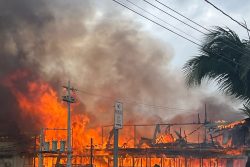Dear Editor,
Well known social commentator Mr. Ravi Dev stated in a recent newspaper letter that the PPP/C has an option to call snap elections in Guyana. His rationale is the perception that the PNCR and the AFC are in disarray prior to and following their recent party congress. Even if these parties are in some internal trouble, the PPP/C, in my opinion, would not be tempted to call snap elections.
The PPP/C had several months of interaction with Guyanese before the 2020 elections to develop a manifesto, which they declared as a “covenant” with the people. In that manifesto, whose theme was “Our Plan for Prosperity,” they stated: “We all want a society which is free, prosperous, socially equitably, globally competitive and which serves every Guyanese equitable.” In the 2020 manifesto, the PPP/C made several promises such as to allocate 50,000 house lots, create 50,000 new jobs, and reduce VAT on several items like education and health, and re-open of sugar estates.
The PPP/C wants to ensure that the range and scope of promises are fully realized. They do not want to disappoint the people for not being able to fulfill their promises, as did the APNU+AFC coalition. A snap election would derail the remaining estimated 10% of promises such as cheaper and reliable energy; blending fossil fuel with ethanol to reduce carbon impact; creating an International Center of Excellence for Biological Diversity; and constitutional reform. It would also stall the momentum of the country’s rapid development thrust which had an initial setback due to 2 years of Covid-19 diversion.
The PPP/C also wants to enhance its “trust” with the electors, and one way to achieve this is to fulfill all of their manifesto promises. They have even gone beyond the manifesto promises, for example, to build 3,435 homes and several schools. The PPP/C pledged to “build, renovate, and rehabilitate” schools. They have exceeded all reasonable expectations: they have already scheduled 22 secondary and 6 primary schools for construction during their term in office. Not to mention the grant of ($(G) 600,000 (or $US 2,884) per year for patients on dialysis treatment, while continuing to build trust.
Racial discrimination has been a major political tool of the opposition and they have had the PPP/C on the defensive on occasions. However, when the PPP/C began to provide ethnic breakdown of house lots, scholarships, jobs, skills training, etc., the opposition has switched focus onto corruption, which has been receiving heightened national attention since the revelation of alleged gold smuggling by 3 Guyanese; the dismantling of a Chinese gold smuggling ring; and the massive corruption at police headquarters. These aberrations must be thoroughly investigated and prosecuted to restore confidence to the Guyanese people. The PPP/C needs to finish the job. A snap election would be viewed as a distraction.
While the PPP/C has enough evidence (data) of fairness in the allocation of resources, the opposition still finds that race discrimination has political traction for them. They would not give up this as a political tool in their seemingly limited arsenal.
While the results of the 2023 local government election show that issues are becoming more important to voters, both the PPP/C and PNCR also know that race is still the main determinant in political preferences. Despite the mediocre performance of the APNU+AFC coalition (sending home 7,000 sugar workers) they lost the 2020 elections by less than 3% of votes cast, while the PPP/C won a majority by less than 1%. With significant demographic changes in the population, the electoral process has become more competitive. Whether the opposition forces share this position is unclear as they continue to push for executive power sharing.
The PPP/C knows that “trust” is an essential political capital that must be earned but knows equally that it would take time to build and sustain it. They would therefore utilize the remainder of their term to continue building trust by taking government to the people, revitalizing neighbourhoods, enhancing social and physical infrastructure, crackdown on corruption, and fulfilling their remaining promises. They know that trust could also earn them traditional PNCR cross over votes. They would not take any risk to call a snap election but continue to work hard to win people’s trust and ultimately their votes. They would therefore utilize their remaining time in office to build, build, and build. A snap election is anathema to their vision and electoral strategy.
Sincerely,
Dr. Tara Singh









